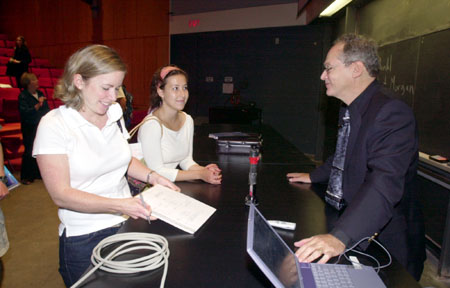Howard Hughes $1M grant awarded

Richard M. Losick, Harvard College Professor and Maria Moors Cabot Professor of Biology in the Faculty of Arts and Sciences (FAS), has received a $1 million grant to support innovations in his teaching of science to Harvard undergraduates.
As one of 20 newly named Howard Hughes Medical Institute (HHMI) Professors, Losick, a molecular biologist, will apply his grant to three programs designed to stimulate, and sustain, undergraduate interest in the sciences.
One program, geared toward incoming freshmen with weaker backgrounds in science, will place selected students in faculty laboratories, where they can receive mentoring and gain hands-on research experience as a complement to their lecture classes. “The idea is that we don’t lose them to the sciences their first year here, and we get them to consider a career in experimental sciences,” Losick says.
Losick, who has taught at Harvard for more than three decades, and whose creative and caring approach to learning was honored two years ago when he was named a Harvard College Professor, also plans to challenge students who have exceptional experience in the sciences. By pairing postdoctoral researchers with undergraduates who, for instance, have already cloned and sequenced DNA in high school or have similarly advanced experiences before coming to Harvard, Losick hopes to nurture those undergraduates’ interests and guide them to senior theses and careers beyond.
His own excitement about science fuels his desire to make learning exciting for others.
“In science you can learn something that nobody else on earth ever knew before,” he says. “However small and modest it might be, there’s a special thrill about learning how living things function – the inner workings of living things. If you learn some new aspect of it, even if it’s a tiny part, you’ve advanced knowledge for the whole of humankind.”
Losick’s third goal is to develop his use of computer animation in the classroom. “In molecular biology, Web-based animation is a powerful heuristic tool,” he says. “A lot of the things I teach are very dynamic.”
DNA duplication, for instance, is carried out by “molecular machines with multiple moving parts. To try to explain this with a static diagram isn’t as satisfactory as an animation that can show the process over time, parts moving, so you can get a real flavor of how molecular biologists view this as it’s taking place inside a cell.”
Losick has worked with undergraduates to develop animated films; with the HHMI grant, he hopes to further this process, and at a greater level of sophistication.
“We are delighted that HHMI shares our commitment to the most innovative and effective teaching of science to our undergraduates,” says William C. Kirby, dean of FAS. “Having already been named a Harvard College Professor for his excellence in the classroom, Professor Losick is a natural for this award. He is a distinguished molecular biologist, and I am gratified that the HHMI has recognized his ability to inspire our students through innovation and creativity in the science curriculum.”




